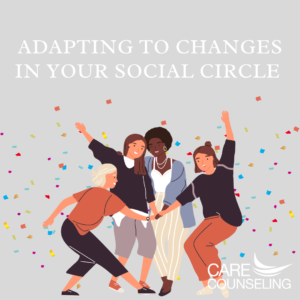Adapting to Changes in Your Social Circle
 As we journey through life, our career paths often take unexpected turns. Whether it’s changing jobs, pursuing higher education, or relocating for work, career transitions can have a profound impact on various aspects of our lives, including our friendships. As we navigate these changes, it’s essential to recognize that our social circles may also evolve. Adapting to these shifts in friendship dynamics requires understanding, open communication, and a willingness to embrace new connections.
As we journey through life, our career paths often take unexpected turns. Whether it’s changing jobs, pursuing higher education, or relocating for work, career transitions can have a profound impact on various aspects of our lives, including our friendships. As we navigate these changes, it’s essential to recognize that our social circles may also evolve. Adapting to these shifts in friendship dynamics requires understanding, open communication, and a willingness to embrace new connections.
The Impact of Career Transitions on Friendships
- Time Constraints
Career transitions often come with increased responsibilities and time commitments. Starting a new job or pursuing further education may leave less time for socializing or maintaining regular contact with friends. As a result, existing friendships might face challenges in staying as connected as they once were.
- Geographic Distance
Relocating for work can significantly alter the dynamics of friendships. The physical distance may limit in-person interactions, making it necessary to find new ways to stay connected, such as through virtual meetings or occasional visits.
- Changing Interests and Priorities
Career transitions can lead to shifts in interests and priorities. As individuals embark on new professional paths, they may become engrossed in their work or studies, potentially leading to changes in shared interests with friends.
- Emotional Support Needs
Career transitions can be emotionally taxing, with feelings of excitement and uncertainty intermingled. Friends may need to adjust to each other’s emotional support needs during these times of change.
- Balancing Social and Professional Networks
Finding a balance between social and professional networks can be challenging during career transitions. As individuals invest time in building new professional connections, it’s essential to maintain and nurture existing friendships.
Navigating Friendship Dynamics during Career Transitions
- Open Communication
Effective communication is key to navigating friendship dynamics during career transitions. Be honest and open with your friends about the changes happening in your life. Share your feelings, concerns, and needs, and encourage them to do the same.
- Prioritize Quality over Quantity
While time constraints may limit the frequency of interactions, prioritize the quality of the time spent with friends. Try to be present and engaged during your interactions, whether virtual or in-person.
- Embrace Virtual Connections
Leverage technology to stay connected with friends, especially if geographic distance is a barrier. Video calls, messaging apps, and social media platforms provide opportunities to maintain regular contact and share life updates.
- Support Each Other’s Goals
Show support for your friends’ career transitions and endeavors. Celebrate their achievements and milestones and be understanding if they need space to focus on their professional growth.
- Foster New Friendships
Embrace the potential for new friendships during career transitions. New workplaces, schools, or social circles offer opportunities to meet like-minded individuals with shared interests.
- Plan Reunion Gatherings
Organize reunion gatherings with friends whenever possible, even if they are infrequent. These gatherings offer cherished moments of connection and create lasting memories.
- Be Patient and Understanding
Transitions can be emotionally challenging for everyone involved. Be patient with yourself and your friends as you navigate these changes together. Understand that adjustments take time, and it’s normal for friendship dynamics to shift.
The Benefits of Adapting to Friendship Changes
- Resilience in Relationships
Adapting to changes in friendship dynamics builds resilience in relationships. It allows friends to navigate challenges together, fostering a deeper sense of understanding and support.
- Diversity in Perspectives
Embracing new connections during career transitions introduces diverse perspectives and experiences into your social circle. These fresh insights can enrich your life and broaden your horizons.
- Strengthened Bonds
Going through career transitions together can strengthen the bonds between friends. The shared experiences and support during times of change create a unique bond that endures over time.
- Personal Growth
Navigating career transitions and adapting to friendship changes can lead to personal growth. As you learn to embrace new connections and communicate effectively, you develop valuable life skills.
Career transitions are an inevitable part of life, bringing both excitement and challenges. As we embark on new professional paths, it’s essential to recognize the impact these changes can have on our friendships. Adapting to shifting friendship dynamics requires open communication, understanding, and a willingness to embrace new connections.
While time constraints, geographic distance, and changing interests may pose challenges, they also present opportunities for growth and resilience in relationships. Embrace virtual connections, prioritize quality interactions, and show support for each other’s goals. Remember that navigating these changes together can create lasting memories and strengthen the bonds that define true friendship. Embrace the beauty of evolving friendships as you journey through the various stages of your career, knowing that the connections you cultivate will be a source of joy, support, and companionship for years to come.



























